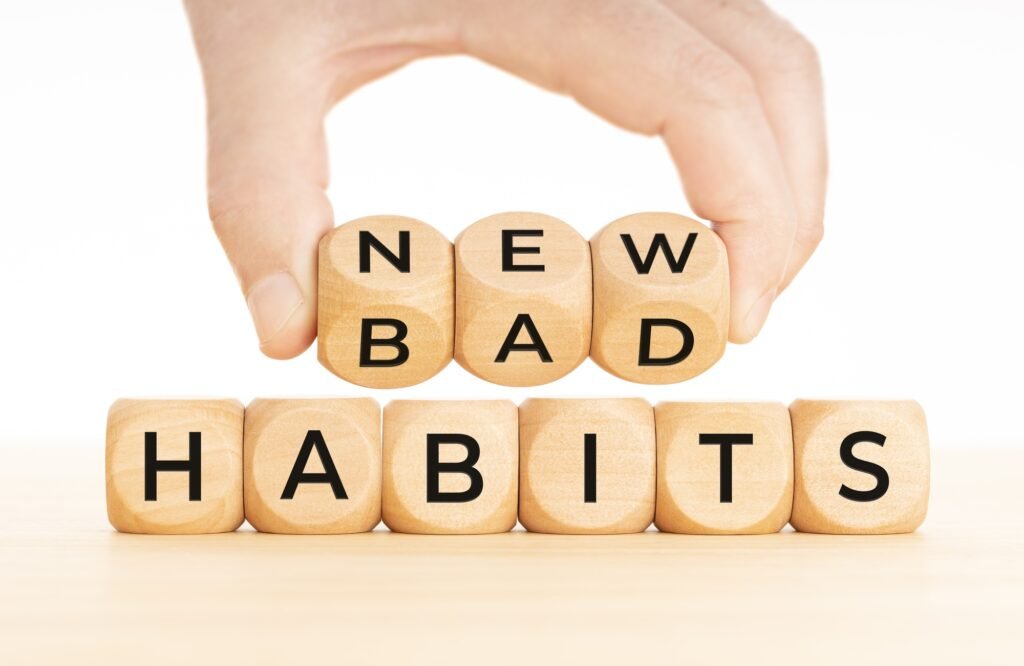Bad Habits : 5 Powerful Ways to Break Free from Bad Habits

Habits are powerful forces that shape our daily lives and ultimately determine our success or failure. They are the routines and behaviors that we engage in without even thinking about them, often on a subconscious level. Understanding the power of habits is crucial to making positive changes in our lives. When we recognize the impact that habits have on our behavior, we can begin to take control of them and make intentional choices about the habits we want to cultivate.
Habits are formed through a process called “chunking,” where our brains create neural pathways that make it easier for us to repeat certain behaviors. This is why habits can be so difficult to break – our brains have literally been rewired to make these behaviors automatic. However, this also means that we have the power to rewire our brains for positive habits. By understanding the science behind habits, we can begin to see how they are formed and how we can change them. This knowledge empowers us to take control of our habits and make intentional choices about the behaviors we want to cultivate.

Topics
Bad Habits! Identifying and Recognizing Your Bad Habits
The first step in making positive changes in our lives is to identify and recognize our bad habits. This requires a deep level of self-awareness and honesty with ourselves. It can be easy to overlook or rationalize our bad habits, but in order to make meaningful change, we must be willing to confront them head-on. This may involve keeping a journal or tracking our behaviors to identify patterns and triggers that lead to our bad habits.
Once we have identified our bad habits, it is important to recognize the impact they have on our lives. Bad habits can hold us back from reaching our full potential, causing us to feel stuck or unfulfilled. They can also have negative effects on our physical and mental health, leading to stress, anxiety, and other issues. By acknowledging the negative impact of our bad habits, we can begin to build the motivation and determination to make a change.
Creating a Plan for Change
After identifying and recognizing our bad habits, the next step is to create a plan for change. This involves setting clear and achievable goals for the habits we want to change or replace. It is important to be specific about what we want to achieve and how we plan to do it. This may involve breaking down larger goals into smaller, more manageable steps, making it easier to track progress and stay motivated.
In addition to setting goals, it is important to identify potential obstacles and develop strategies for overcoming them. This may involve changing our environment, seeking support from others, or finding alternative behaviors to replace our bad habits. It is also important to be patient with ourselves and recognize that change takes time. By creating a plan for change, we can set ourselves up for success and increase our chances of making lasting improvements in our lives.
Implementing Positive Habits and Behaviors
Once we have a plan in place, the next step is to implement positive habits and behaviors. This may involve making small changes to our daily routines or finding new ways to approach familiar tasks. It is important to be consistent and persistent in our efforts, as building new habits takes time and effort. This may involve setting reminders or creating accountability systems to help us stay on track.
In addition to implementing positive habits, it is important to focus on self-care and well-being. This may involve finding ways to reduce stress, improve sleep, or engage in activities that bring us joy and fulfillment. By prioritizing our physical and mental health, we can create a strong foundation for building positive habits and behaviors.
Overcoming Obstacles and Setbacks
As we work towards implementing positive habits and behaviors, it is inevitable that we will face obstacles and setbacks along the way. It is important to be prepared for these challenges and develop strategies for overcoming them. This may involve seeking support from others, adjusting our plans as needed, or finding new ways to stay motivated.
It is also important to practice self-compassion and forgiveness when we experience setbacks. Making positive changes in our lives is not always easy, and it is natural to encounter obstacles along the way. By being kind and understanding towards ourselves, we can bounce back from setbacks and continue moving forward towards our goals.
Seeking Support and Accountability
Seeking support and accountability from others can be a powerful tool in making positive changes in our lives. This may involve sharing our goals with friends or family members, joining a support group, or working with a coach or mentor. Having a strong support system can provide encouragement, motivation, and guidance as we work towards building positive habits and behaviors.
In addition to seeking support from others, it is important to hold ourselves accountable for our actions. This may involve tracking our progress, setting deadlines for our goals, or finding ways to stay motivated when faced with challenges. By taking responsibility for our actions and holding ourselves accountable, we can increase our chances of success in making positive changes in our lives.
Celebrating and Sustaining Your Success
Finally, it is important to celebrate and sustain our success as we work towards building positive habits and behaviors. This may involve acknowledging our progress, rewarding ourselves for reaching milestones, or finding ways to stay motivated as we continue on our journey of personal growth.
Sustaining our success involves making our new habits a permanent part of our lives. This may involve finding ways to integrate them into our daily routines, staying mindful of potential triggers that could lead us back into old habits, and continuing to seek support from others as needed. By celebrating and sustaining our success, we can create lasting changes in our lives that lead to greater fulfillment and happiness.









